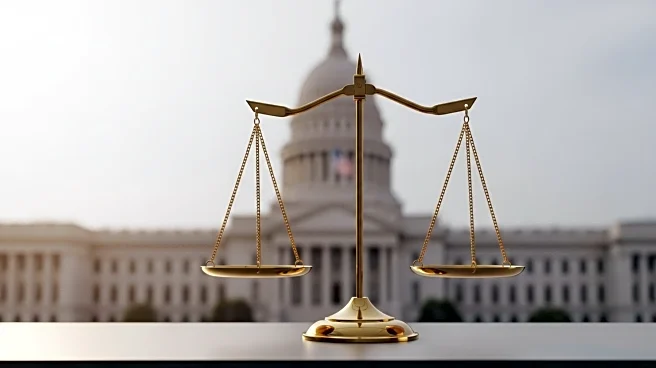What's Happening?
President Trump's administration is encouraging Republican lawmakers to rebrand his signature domestic policy legislation, originally called the 'One Big Beautiful Bill,' to the 'Working Families Tax Cut Bill' or 'Working Families Tax Plan.' This move comes as the legislation faces significant unpopularity due to its sweeping cuts to Medicaid and social safety net programs, as well as changes to the Affordable Care Act. The administration believes the unpopularity is a branding issue rather than a problem with the policies themselves. The briefing, led by White House press secretary Karoline Leavitt and other campaign officials, aimed to strategize for the upcoming midterm congressional campaigns.
Why It's Important?
The rebranding effort highlights the challenges faced by President Trump and the Republican Party in maintaining control of the House amid voter dissatisfaction with the legislation. The bill's cuts to Medicaid and other social programs have been criticized by Democrats, who argue that it disproportionately benefits wealthy Americans while harming working families. The administration's focus on rebranding suggests a recognition of the political risks associated with the legislation and the need to improve public perception to secure electoral success. This development could influence the political landscape and voter sentiment leading up to the midterm elections.
What's Next?
Republican lawmakers are expected to adopt the new branding in their campaign messaging, emphasizing the benefits of the tax plan for working families. The administration hopes that as voters experience the effects of the legislation, public opinion will shift in favor of the bill. However, Democrats are likely to continue opposing the measure, highlighting its impact on social programs and working-class Americans. The success of the rebranding effort will be crucial for the Republican Party's strategy in the upcoming elections, as they seek to maintain their majority in the House.
Beyond the Headlines
The rebranding effort raises questions about the ethical implications of political messaging and the transparency of legislative impacts. Critics may argue that the focus on branding over substance reflects a broader trend in political communication, where image and perception are prioritized over policy details. This situation underscores the importance of informed public discourse and the role of media in scrutinizing political narratives.











